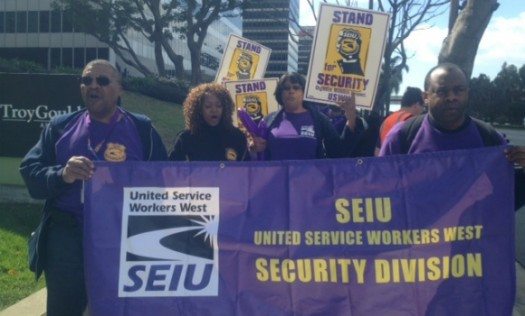

Gallup and Pew concur: Just over one-half of Americans approve of labor unions.
In late June, the Pew Research Center released the results of its biennial poll on unions and corporations, and reported that 51 percent of Americans had a favorable view of unions—up from just 41 percent in 2011, the last time Pew popped the question. Pew’s new number is almost identical to Gallup’s, which found that 52 percent of Americans approved of unions when it last asked that question in August of 2012. Gallup polls on union approval every year and has reported a 52 percent approval rating each of the past three years. Before then, union approval had hit an all-time low for Gallup surveys, with just 48 percent in 2009.
(This post first appeared on the American Prospect and is republished with permission.)
» Read more about: New Polls Show Rising Approval of Unions »


(Spoiler Alert: The last paragraph of this review of Timothy Sheard’s novel, A Bitter Pill, reveals plot endings.)
When a business-oriented company takes over the management of the James Madison Medical Center in Philadelphia, Pennsylvania, it is immediately clear that things are about to change, and not for the better. The sudden appearance of the Committee to Save James Madison – supposedly established by a group of disgruntled employees who don’t think the union has their best interests at heart, but in actual fact created by Croesus Health Care, the new owners of the hospital – is the first clue that the bosses are eager to crush the workers’ organization, fire staff and focus on the bottom line, service delivery be damned. In short order, everyone’s work life is turned upside down as a petition drive to decertify said union to “save jobs” leads to mayhem, murder and more.
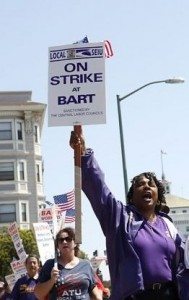
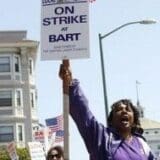
 While a new labor contract is still being negotiated, SEIU 1021 and ATU 1555 have already won the 2013 BART strike. Prior to last week, both unions faced an untenable choice: Accept another round of concessions demanded by BART [Bay Area Rapid Transit] or risk alienating hundreds of thousands of BART riders by closing down the system. A successful strike would not be easy. It required rank and file solidarity, and the building of a strong community-labor coalition. It also meant withstanding an anti-union media blitz that framed the conflict as between a BART management that cared about riders and taxpayers, and a union workforce that only cared about “selfish” goals.
While a new labor contract is still being negotiated, SEIU 1021 and ATU 1555 have already won the 2013 BART strike. Prior to last week, both unions faced an untenable choice: Accept another round of concessions demanded by BART [Bay Area Rapid Transit] or risk alienating hundreds of thousands of BART riders by closing down the system. A successful strike would not be easy. It required rank and file solidarity, and the building of a strong community-labor coalition. It also meant withstanding an anti-union media blitz that framed the conflict as between a BART management that cared about riders and taxpayers, and a union workforce that only cared about “selfish” goals.
But as the dust from the strike clears, it is BART management that is under pressure to improve its offer. Both unions resume negotiations in a much stronger position than before the strike, and retain the option of striking again should BART still refuse to negotiate in good faith.
» Read more about: BART Managers Got Free Media Pass During Strike »
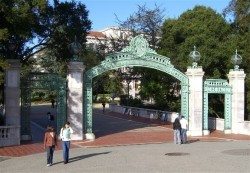

 A basic economic principle is government ought to tax what we want to discourage, and not tax what we want to encourage.
A basic economic principle is government ought to tax what we want to discourage, and not tax what we want to encourage.
For example, if we want less carbon dioxide in the atmosphere, we should tax carbon polluters. On the other hand, if we want more students from lower-income families to be able to afford college, we shouldn’t put a tax on student loans.
Sounds pretty simple, doesn’t it? Unfortunately, congressional Republicans are intent on doing exactly the opposite.
Earlier this year the Republican-led House passed a bill pegging student-loan interest rates to the yield on the 10-year Treasury note, plus 2.5 percentage points. “I have very little tolerance for people who tell me that they graduate with $200,000 of debt or even $80,000 of debt because there’s no reason for that,” Rep. Virginia Foxx (R-NC), the co-sponsor of the GOP bill, said.
» Read more about: Conservatives: Tax Students, Not Polluters »

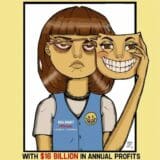
I recently had the privilege of attending a banquet recognizing Walmart workers who have dedicated themselves to winning policy changes that affect the way they are treated by this retail giant. The event was held at the First AME Church of Los Angeles, which has been in the forefront of fighting for civil rights and social justice.
Many stories shared by the workers reflected the nightmare that is their Walmart employment experience. One very nervous young woman spoke of being seriously injured when luggage from a storage rack fell on her back. Her supervisors refused to administer medical attention or even call for an ambulance; she had to drive herself to a hospital.
There are warehouse workers at subcontracted facilities who find themselves working in trailers whose temperatures reach more than 100 degrees – such workers are faced with limited water availability and supervisors who don’t permit frequent breaks for employees to cool down.
» Read more about: Walmart Employees Recount Grim Working Environment »
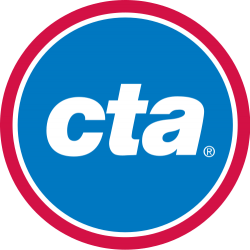

 (The following post originally appeared on the blog for Next City, “a non-profit media organization dedicated to connecting cities and informing the people who work to improve them.”)
(The following post originally appeared on the blog for Next City, “a non-profit media organization dedicated to connecting cities and informing the people who work to improve them.”)
Chicago labor groups are pissed. And they have a right to be. The Montreal-based company Bombardier Transportation was awarded a $1.14 billion contract to build more than 700 train cars for the Chicago Transit Authority, and the local workforce has been left out.
The greater Chicago area and Illinois were cut out of thousands of jobs on this public project, according to the Chicago Tribune, and nine labor and community groups have written a letter calling on the CTA to change the procurement process and include a requirement for local job creation for the next batch of rail cars — 846 cars to the tune of roughly $2 billion — set to be built over the next decade.
» Read more about: Chicagoans Say: Follow L.A. Metro’s Employment Plan »


 The upcoming Major League Baseball All-Star Game will be the first hosted by the New York Mets since 1964, reminding me that following the All-Star break that same year, my St. Louis Cardinals staged one of the most thrilling comeback stories in baseball history.
The upcoming Major League Baseball All-Star Game will be the first hosted by the New York Mets since 1964, reminding me that following the All-Star break that same year, my St. Louis Cardinals staged one of the most thrilling comeback stories in baseball history.
I say “my Cardinals” because during my adolescence in Lawn Guyland, my friends and I lived and died by the clubs we followed. For us, the glories and the tragedies of the Cards, Don’s Dodgers, Josh’s Braves, Peter’s Giants and Lenny’s Yankees were as intense as the ups and downs of our relationships with our girlfriends. If we’d had girlfriends, that is.
In September of 1964, with just 12 games to go, we (always “we,” never “they”) were 6.5 games behind the Philadelphia Phillies, whose notorious Philly Phold — the team lost 10 in a row — led to an extraordinary final two days with four teams still in the race.
» Read more about: House of Cards: A Pennant Race Remembered »


 Where will this century’s jobs come from? What can we do about youth unemployment and underemployment? How can today’s developed countries maintain their labor standards and environmental laws in the face of competition from China and Southeast Asia?
Where will this century’s jobs come from? What can we do about youth unemployment and underemployment? How can today’s developed countries maintain their labor standards and environmental laws in the face of competition from China and Southeast Asia?
These are questions that keep parents awake at night worrying for the futures of their children. The usual answers offer little hope. No wonder today’s underemployed twentysomethings are so depressed.
To judge by the headlines, tomorrow’s good jobs will all be in high technology and the Internet. But the world only needs so many instant-millionaire app developers. For most young people, becoming an Internet millionaire simply isn’t an option.
The other booming area is the low-wage service sector. The world needs more caregivers, nannies, cleaners, gardeners and wait staff. So much for the knowledge economy.
Gone are the good jobs in manufacturing that used to provide steady employment to millions.
» Read more about: Good-Job Creation: A Path to Growth or the Road Not Taken? »
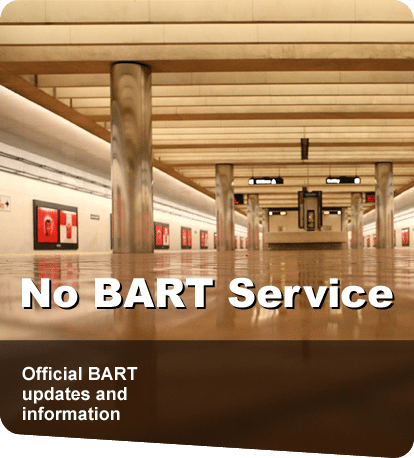

 While the 2013 BART [Bay Area Rapid Transit] strike involves current disputes over wages, pensions and worker safety, its roots go back decades. BART management and its workforce have long had a poisonous relationship. The 90-day 1979 strike/lockout is the most obvious example, and despite the last strike occurring back in 1997, bargaining always goes down to the wire with a work stoppage imminent. Why is this relationship so stormy? The chief reason is BART management’s historic insensitivity to its workers.
While the 2013 BART [Bay Area Rapid Transit] strike involves current disputes over wages, pensions and worker safety, its roots go back decades. BART management and its workforce have long had a poisonous relationship. The 90-day 1979 strike/lockout is the most obvious example, and despite the last strike occurring back in 1997, bargaining always goes down to the wire with a work stoppage imminent. Why is this relationship so stormy? The chief reason is BART management’s historic insensitivity to its workers.
For over thirty years, BART’s primarily white management has disrespected its heavily minority workforce. And while compensation levels could reduce tensions over this lack of respect in good times, in the recent down years BART workers have gone backward. These workers (along with riders) have paid the price when the BART Board’s suburban majority long refused to raise revenue by charging for parking at its stations, and when BART squandered money on costly expansions rather than improving safety and service in existing areas.
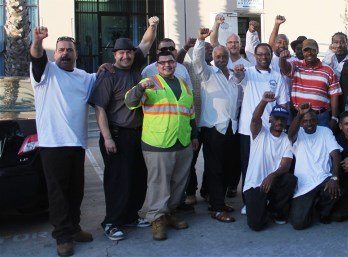

The trucking industry likes to say, “If you have it, a truck brought it.” The industry’s point is that trucking is an essential and ubiquitous part of our economy.
This is true, so far as it goes. But trucks don’t drive themselves. And so at a recent meeting of the Carson City Council, a slightly different message was on display: If you want a good job, you’re no longer likely to find it in port trucking – at least not without a fight.
Carson, located 10 minutes north of Los Angeles’ harbor, is a major hub of port trucking: Fifty-two port trucking companies operate there — more than in any other Southern California city except L.A. and Long Beach; hundreds of truck drivers call Carson home and more than 1,000 port trucks are parked in town. The conditions of the industry impact the city profoundly — from road safety to environmental quality to jobs to tax revenue.
» Read more about: Carson Pledges Support for “Modern-Day Sharecroppers” »